The mother and father of a one-year-old child have been charged with abandoning the infant in an overheated car in Mississauga.
Police say they received a 9-1-1 call shortly before 12:30 p.m. from the area of Tranmere Drive and Derry Road East near Dixie Road.
The child was found locked alone in a white, four-door car parked in a lot on Tranmere and officers say the child was “in distress.”
The child was removed and taken to hospital where they are expected to make a full recovery. One officer also suffered minor injuries during the rescue.
Investigators have charged a 28-year-old man and a 27-year-old woman with failing to provide the necessities of life and abandoning a child. They are expected to appear in court on August 9.
The suspects have not been identified.
Peel police are working with the “appropriate community support service” to ensure the wellbeing of the child.
Police are also emphasizing the dangers of leaving a child unattended in a vehicle, especially in the summer months. The temperatures in Mississauga reached a high of 33.3 C on Tuesday, one of the hottest days of the year so far.
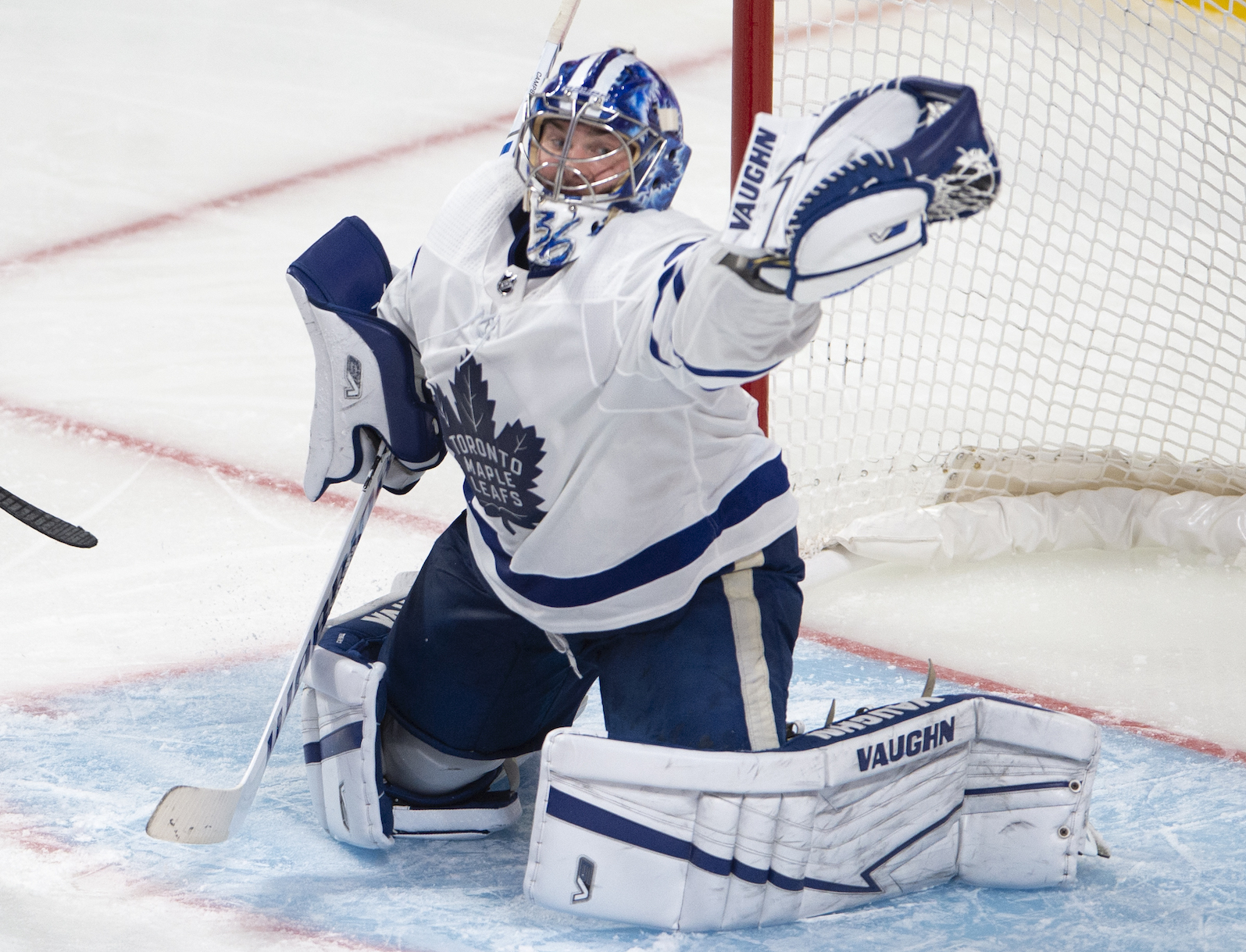
Jack Campbell made 32 saves to record his first post-season shutout, Alex Galchenyuk set up two goals and scored into the empty net against his former team, and the Toronto Maple Leafs defeated the Montreal Canadiens 4-0 on Tuesday to take a commanding 3-1 lead in their first-round series.
Jason Spezza, with a goal and an assist, the red-hot William Nylander and Joe Thornton also scored for Toronto, which can wrap up this best-of-seven meeting between Original Six rivals at home Thursday in Game 5. Alexander Kerfoot had three assists.
Carey Price stopped 24 shots for Montreal. The Canadiens have scored just four times in 12 periods on Campbell in the first playoff meeting between the storied franchises since 1979.
The Leafs, who won consecutive post-season games in Montreal for the first time since the 1967 Stanley Cup final on the heels of Monday’s hard-fought 2-1 victory, haven’t advanced to the second round since 2004.
Toronto is 11-1 all-time when leading a series 3-1 – a situation the Leafs haven’t found themselves in since 1987 – while 91 per cent of NHL teams have advanced in the same scenario all-time.
If the Canadiens can force a Game 6 back in Montreal on Saturday, the Quebec government will allow 2,500 fans into the Bell Centre, which would be the first NHL crowd in this country since the start of the COVID-19 pandemic in March 2020.
Toronto opened the scoring 1:27 into the second period when Nylander shovelled home his fourth goal in as many games in the series after taking a slick behind-the-back feed in tight from Galchenyuk on an odd-man rush.
Selected No. 3 overall by the Canadiens at the 2012 draft, a resurgent Galchenyuk has found a home with the Leafs – the fifth club he’s suited up for since Montreal dealt him to the Arizona Coyotes in 2018 for Max Domi.
Campbell stopped Eric Staal at the other end on the next shift before Joel Armia fanned on a great chance later in the period. The Leafs broke the other way with Galchenyuk saucering a pass to Spezza, who was robbed by Price in Game 3 and stopped on a breakaway in Tuesday’s first period, for the 37-year-old to bury his second of the series on a 2-on-1 at 12:28.
The North Division’s No. 1 seed, Toronto kept its foot on the gas, and Thornton made it 3-0 just 2:28 later on a power play when he redirected a Spezza feed at the side of Price’s net. At 41 years and 327 days, the veteran forward became the oldest Leafs player to record a playoff point, passing both Ron Francis the late Allan Stanley (both 41 years, 62 days).
Thornton also became the oldest Leaf to score in the post-season, passing Patrick Marleau (38 years, 222 days).
The goal was Toronto’s third with the man advantage in the series after finishing the regular season a dismal 5 for 73.
Montreal’s anaemic power play – 0 for 11 in the series after two failed man advantages in the first – got another opportunity late in the period, but Brendan Gallagher’s shot that beat Campbell clanked off the post.
The desperate Canadiens pushed to start the third, with Campbell blocking Gallagher’s tipped effort before smothering the rebound.
Thornton took a tripping penalty to give Montreal its fourth power play, but Campbell once again held the fort before Price kept his team alive with a stop on a Zach Hyman breakaway midway through the period.
A healthy scratch in Game 1, Galchenyuk iced it into the empty net to secure the first three-point playoff game of his career as the Canadiens now faces the daunting task of having to win three straight to keep their season alive.
The Leafs were minus captain John Tavares (concussion, knee) and forward Nick Foligno (lower-body injury), while defenceman Travis Dermott got the nod ahead of Rasmus Sandin, and centre Adam Brooks took Riley Nash’s spot.
Staal returned to the Canadiens’ lineup after missing Game 3, but Artturi Lehknonen, who left Monday’s contest in the first period, and Jake Evans, out for a third straight night, were both scratched.
Toronto got the game’s first chance when Spezza _ robbed by Price on a spectacular stick save in Game 3 _ moved in alone early, but was unable to beat the Montreal goaltender through the five-hole.
The Canadiens got those two man-advantage opportunities in the opening period’s latter stages. And while Montreal had better zone time and a couple decent looks, Campbell was never really threatened.
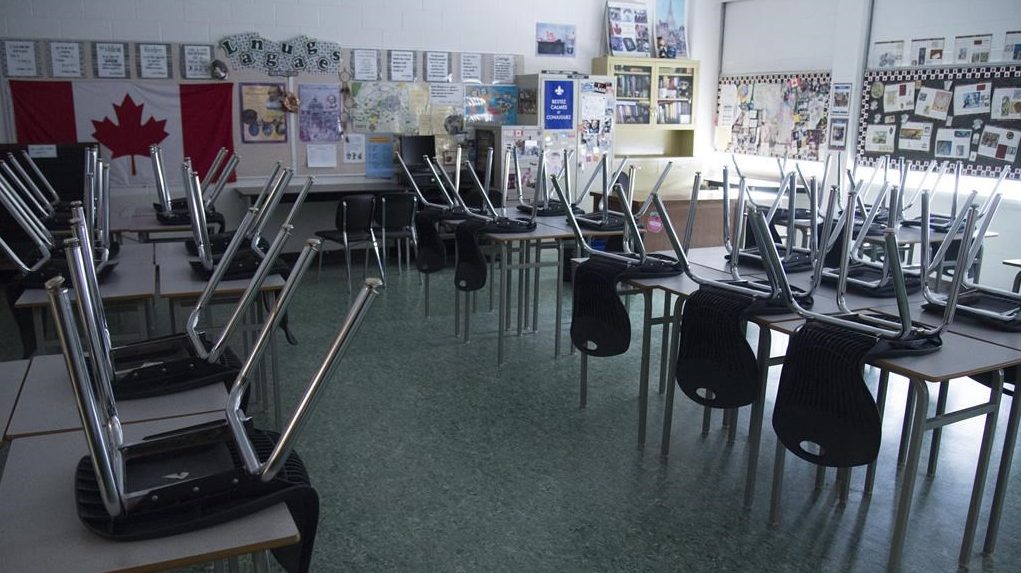
Ontario’s top doctor said Tuesday he would like to see students return to their classrooms before the province starts reopening in mid-June.
Dr. David Williams made the comments on the same day as a group of researchers studying the effects of the pandemic on children warned of “a generational catastrophe.”
Williams said most public health units in the province support the reopening of schools, which have been shut to in-person learning since early- to mid-April.
“My position has been always, like our public health measures table and our medical officers of health, that feel that schools should be the last to close and the first to open,” Williams told a news conference.
“Ideally, I’d like the schools open before we enter Step 1 of our exit strategy.”
Williams said he has heard from many public health agencies, including those in the hard-hit Toronto area, who want to see schools reopen.
Cases of COVID-19 continue to fall in the third wave of the pandemic while Ontario remains under a stay-at-home order. Vaccinations continue to surge with more than 8.2 million people receiving their first shot.
Williams said the situation is different now compared to when the province shuttered schools in early April.
“We’re confident that we can be supportive of making sure the schools are safe for everyone, including students and teachers and other staff working there,” Williams said.
Last week, the province faced fierce criticism for failing to address whether schools would reopen as it detailed how the rest of the economy would emerge from the stay-at-home order.
Tracy Vaillancourt, an education professor at the University of Ottawa who specializes in mental health research on children, wrote a letter to Premier Doug Ford and the province calling for the reopening of schools.
“We are on the cusp of a generational catastrophe,” Vaillancourt and 14 other researchers, who are part of a team working on a report about the effects of the pandemic on children, wrote.
“Our professional consensus is that these shutdowns have negatively affected all aspects of child development, that extend well beyond the classroom.”
There have been several reports, including from Toronto’s Hospital for Sick Children, that suggest mental health in children has declined during the pandemic.
Vaillancourt echoed those concerns, but also said schools offer much more than help for mental health afflictions. They allow some students to eat better and more consistently through various programs.
“We also recommend that we prioritize the safe reopening of all extracurricular activities like sports, and we work to ensure that they stay open,” Vaillancourt said.
Teacher unions said last week they support reopening schools, but wanted the province to address their concerns to make them safer.
Those concerns included smaller class sizes along with better testing and contact tracing.
William said he’d also be open to a regional approach to allow some school boards to return to in-person class sooner than others.
Williams says there will be a decision on schools soon.

The Special Victims Unit is investigating after Peel police smashed the window of a car in a Mississauga parking lot to rescue a child locked inside on Tuesday afternoon.
Police say they received a 9-1-1 call shortly before 12:30 p.m. from the area of Derry and Dixie roads.
The child was found locked in a white, four-door car parked in a lot on Tranmere Drive and officers say the child was “in distress.”
The child was assessed by paramedics and then taken to hospital.
Const. Danni Martini said the child was conscious when found but their current condition is unknown at this time.
A witness from a nearby real estate business tells 680 NEWS that a baby was in the back seat of the car. A man who parked beside the car could hear the child crying and went door-to-door at a nearby building to find the child’s parents.
When he could not locate the parents, the woman says they took a hammer from her office and were on their way to break the car’s window when police arrived.
“There were a lot of members of the business community here that were getting very, very anxious, but police arrived and intercepted. They attempted to open the vehicle, couldn’t and used the hammer to break the glass … and rescue the baby,” said the witness.
One officer suffered minor injuries during the rescue.
It is too early in the investigation to say whether any charges will be laid against the child’s parents. No further details about the child or its parents have been released in order to protect the child’s identity.
Peel police say members of the public are encouraged to call 9-1-1 if they see a child or pet locked in a hot car as the weather gets warmer.

Ontario has recorded its first case of an AstraZeneca COVID-19 vaccine-related death.
The province’s Associate Medical Officer of Health Dr. Barbara Yaffe announced Tuesday that a man in his 40s had died a few weeks after getting the first dose of the vaccine at the end of April.
While the investigation is still ongoing, Dr. Yaffe said the man had vaccine induced thrombotic thrombocytopenia or VITT at the time of his death – the rare blood clots associated with the AstraZeneca vaccine.
“The risks associated with this vaccine are rare, but they are real,” she said, noting that those who received an AstraZeneca shot still made the right choice.
The death is the fifth fatal case of VIIT in an AstraZeneca recipient in Canada. Experts still maintain the syndrome is exceedingly rare and treatable in most cases.
The province is currently reporting 16 cases of thrombotic thrombocytopenia syndrome (TTS), of which, 13 meet the criteria for VITT.
Ontario paused the use of the AstraZeneca vaccine as a first dose on May 11 after administering nearly a million doses due to an increased risk of blood clots. The vaccine is currently being administered as a second dose only.
Those who received their first dose between March 10 and 19 became eligible to book their second dose on Monday.
The second shots are being moved up by about 2 weeks and being given at the 10 week mark rather than the recommended 12 weeks as the province rushes to use a stockpile of 45,000 doses set to expire in roughly a week.
Dr. David Williams, Ontario’s Medical Officer of Health, said the difference in vaccine efficacy at 10 weeks as opposed to 12 weeks is negligible.
“We’re seeing now with some new data from the U.K. that people who get two doses, as [time] goes on, their immunity keeps getting stronger and stronger, approaching some of that equal to the mRNA vaccines,” he said. “So it’s not that it’s a hazard to get it earlier, it’s just that the data we have is that it may not be as beneficial. But the actual difference between 10 and 12 is not that large.”
He said “we wouldn’t mind you waiting for 12 weeks,” if possible, but since they have vaccines that need to be utilized before expiry, those who received their first shots during the initial AstraZeneca pharmacy pilot project in the Toronto, Kingston and Windsor areas are being prioritized for their second dose slightly earlier.
He said people should talk to their pharmacists about eligibility and some might have to wait the original 12 weeks after the province has used up the soon-to-expire vaccines.
“I understand there’s a bit of confusion there,” Williams said. “The good point is that we have lots of people who are looking eager to get their second dose.”
Approximately 90,000 people are eligible to receive their second AstraZeneca vaccine at the shortened 10-week interval, according to provincial data — about double the number of doses available.
A spokeswoman for the health minister said many pharmacies and doctors would reach out to patients directly, and asked people to only contact participating pharmacies listed on the province’s booking website.
The province has said those who got their first dose of AstraZeneca after March 19 will be able to book their second in the near future.
Another 10,000 doses of AstraZeneca expire next month and the province has more than 300,000 doses in stock.
With files from The Canadian Press
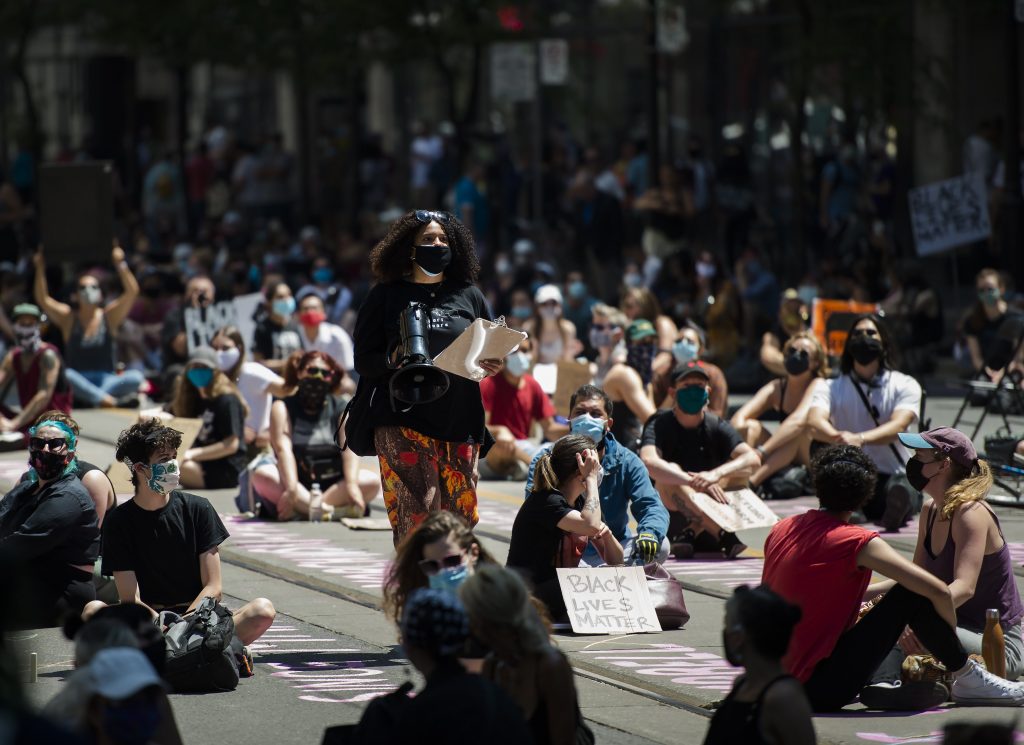
Tuesday marks one year since the killing of George Floyd by a white police officer in Minneapolis. Streets across cities in the U.S., Canada and around the world flooded with protests over his murder, which was captured on video and replayed thousands of times across news and social media.
That video of Derek Chauvin pressing his knee into Floyd’s neck for nine and a half minutes as he lay on the ground on May 25 triggered an outpouring of anger, protest and support from individuals and groups not normally associated with the Black Lives movement.
Rodney Diverlus, co-founder of Black Lives Matter Toronto, was among those protesting in Toronto.
“The very first thought that comes to mind for those of us who were on the ground was deep sadness and deep anger and deep rage and sort of sorrow for George Floyd’s family, for his community – but also for all other communities that are victimized by police violence,” said Diverlus.
Diverlus said last year, you could really see that the ground work of the Black Lives Matter movement had ballooned. He said the major turning point was that they were able to start a conversation by explaining why it was important in the first place.
“Every day people who did not engage in these concepts, who weren’t activists, were talking about the concept of Black Lives Matter with their co-workers, at their dining room tables with their families and in their communities,” he said.
“We have always said, ‘This was not a moment, this is a movement.’ It’s no longer one group of people who are saying something, but all across civil society, we are all saying the same thing, that Black Lives Matter,” added Diverlus.
Diverlus said they no longer have to convince people these issues exist or the urgency of them.
“People saw it for themselves — why Black activists had been calling for transformation within policing for decades,” he said. “Overall, what people were calling for was breath, was the chance to breathe, was a chance to have some space from anti-Black racism.”
Beverly Bain, University of Toronto Professor of Women and Gender Studies, called last summer’s protests a “global uprising,” led by Black activists.
“It was in plain sight. So people witnessed that very slow, deliberate killing of a Black man. And that was like the last straw in this moment that said absolutely ‘enough is enough’,” said Bain.
Now, coming up on a year later, Diverlus says the work has really begun as Black community members follow up on the promises made last summer.
“Governments, public agencies, groups and collectives of all kinds, organizations and business of all kinds were making commitments to addressing anti-Black racism within their own spaces,” said Diverlus. “Black folk that exist within those communities are now calling back to those commitments and are asking for updates and are asking for what has changed.”
Bain adds not only has the Black Lives Matter movement been effective – it’s also grown to connect to and propel other forms of current global uprisings.
“Today we’re seeing the collaboration, support and solidarity between Black organizers and the Black global protests with that of Indigenous protests, with that of Palestinian protests – all in unison, calling for a just world.”
Derek Chauvin, the police officer convicted in Floyd’s murder, is scheduled to be sentenced June 25 and faces up to 30 years in prison.
The trial of three other former officers involved has been pushed back to March of next year. All four are also facing federal civil rights charges.
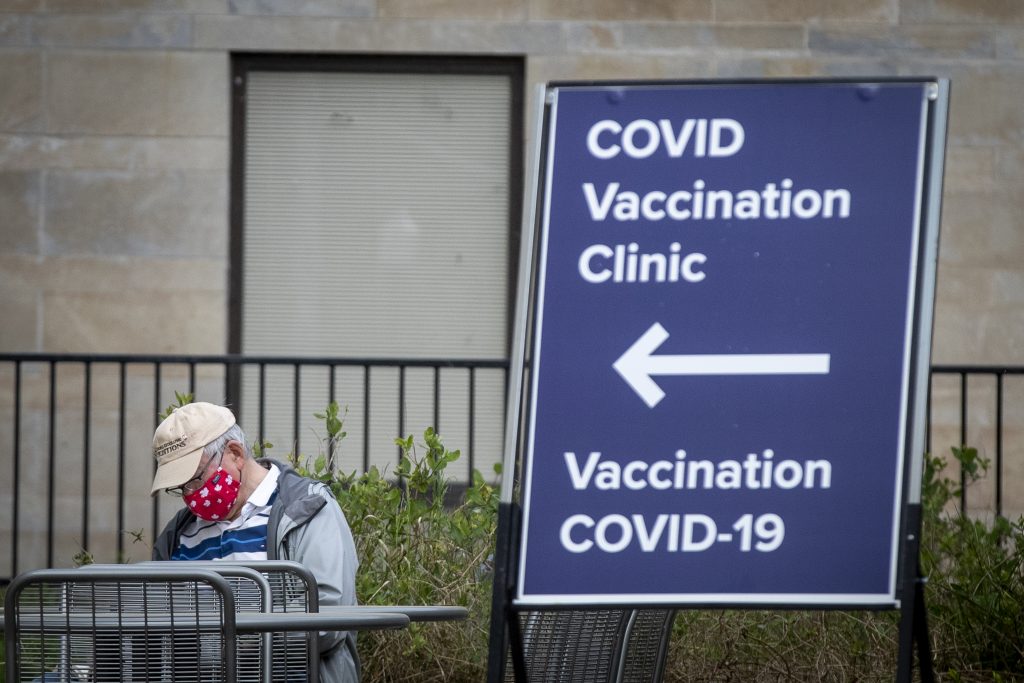
As thousands of youth aged 12 and above line up to get their COVID-19 shots, parents and guardians may be surprised to learn that they don’t have to give permission for their kids to be vaccinated.
“Many people in the public are not aware of this, almost everyone in the province assumes there is an age for healthcare consent but there isn’t,” says Kerry Bowman, a bioethicist and professor at the University of Toronto’s Faculty of Medicine. “You have healthcare workers who are not aware of this legislation either.”
Under Ontario’s Health Care Consent Act, children have control over their own healthcare decisions, unless a doctor deems them incapable. When Peel Region updated its vaccination guidance to note that minors didn’t need parental permission, it touched off a wave of comments and confusion online.
CityNews spoke with viewers about their thoughts on vaccine consent for minors.
“Absolutely, its like any other significant decision in their life, and they’re not old enough in my mind to make it for themselves yet,” says Paul Greenberg.
“They should get their parents’ consent,” says Amy Profenna, who notes that young people could be swayed by peer pressure.
Some of the answers we received from teenagers differed from the adults.
“What if their parents are anti-vaxers, and they’re not anti-vaxers and they want to get the vaccine?” points out teen Nora Gallagher.
Adults and teens told CityNews that guardians and kids should have a family discussion.
“It’s a decision that both of you need to make,” says Owen Campbell. “You talk with each other and see how you both feel, and then I think that you go from there.”
The Canadian Paediatric Society says there is no national age of medical consent, and the only province to establish one is Quebec, where the consent of a parent or guardian is needed for treatment decisions for anyone under 14.
Bowman, who teaches about Ontario’s little-known consent law, notes the rules are meant to protect young people, as well as the elderly.
“The design of it is to protect human rights,” he says. “If a person is a frail elderly person in their 90s, or a young person, people have control and autonomy over their own bodies. That is the spirit of this legislation.”
Clinical studies are already underway to make the vaccine available to even younger children, and Bowman notes in the near future Ontario’s consent legislation could be tested further.
“Eventually as we go below 12, the assessment for the age of consent is going to be very, very important,” he explains. “If you’ve got a 12-year-old who really understands and appreciates — meaning they know what the vaccine is they know what its for they know this really small risk of side effects — they can consent.”
The paediatric society says it’s impossible to make blanket rules about capacity based on someone’s age. Instead, healthcare providers should look at each of their patients as an individual, and take into account “the patient’s emerging self awareness, developing values and beliefs [and] maturing cognitive skills” when confirming a young person is able to consent to a medical procedure.
While the ultimate decision to get vaccinated does rest with a person, no matter their age, the paediatric society also says family discussion is a best practice when a child’s capacity to consent is less certain.
“A family-centred, shared decision-making model best respects and supports the emerging capacity of the paediatric patient as well as parental authority and the knowledge and expertise of health care providers,” the society writes in its position paper on the topic. To help families make decisions, the City of Toronto is hosting several evening vaccination town halls for parents and students this week.
Bowman points out that the vast majority of children go to their medical appointments with their parents, and there’s usually a family discussion and general understanding. CityNews spoke with some who had that very conversation with their kids before taking them to receive their jab today.
“We felt it was important to explain and get him to say yes or no to it. He understands the reasons why we all have to be vaccinated,” says Gareth Roberts, who was taking his 13-year-old son Ethan to get inoculated today.
Ethan adds he and his parents talked about how the vaccine would help the world get back to how it was before the pandemic.
“I said, ‘I’d love to do it,’” he says.
Durham, Halton still working on 12+ vaccination availability
Ontario opened up vaccine eligibility to those aged 12 and up on May 23, ahead of schedule. Because of the early start, not everyone has had the opportunity to book an appointment. Halton and Durham are among the regions that have yet to open bookings to that age group. Both regions’ public health units operate their own booking systems.
Durham’s health department says they’re reviewing their current vaccine supply and appointments to try and accommodate the increased eligibility.
“We anticipate that we will open bookings before the end of this week,” says Glendene Collins, manager of community and resource development for the Durham Region Health Department.
Halton’s health team is working with local school boards on a youth vaccination program for those aged 12 to 17. A notice on Halton Region’s web site says “information on clinic locations and when the booking system will be updated to offer appointments for all 12- to 17-year-olds will be shared as the details of the program are confirmed.”
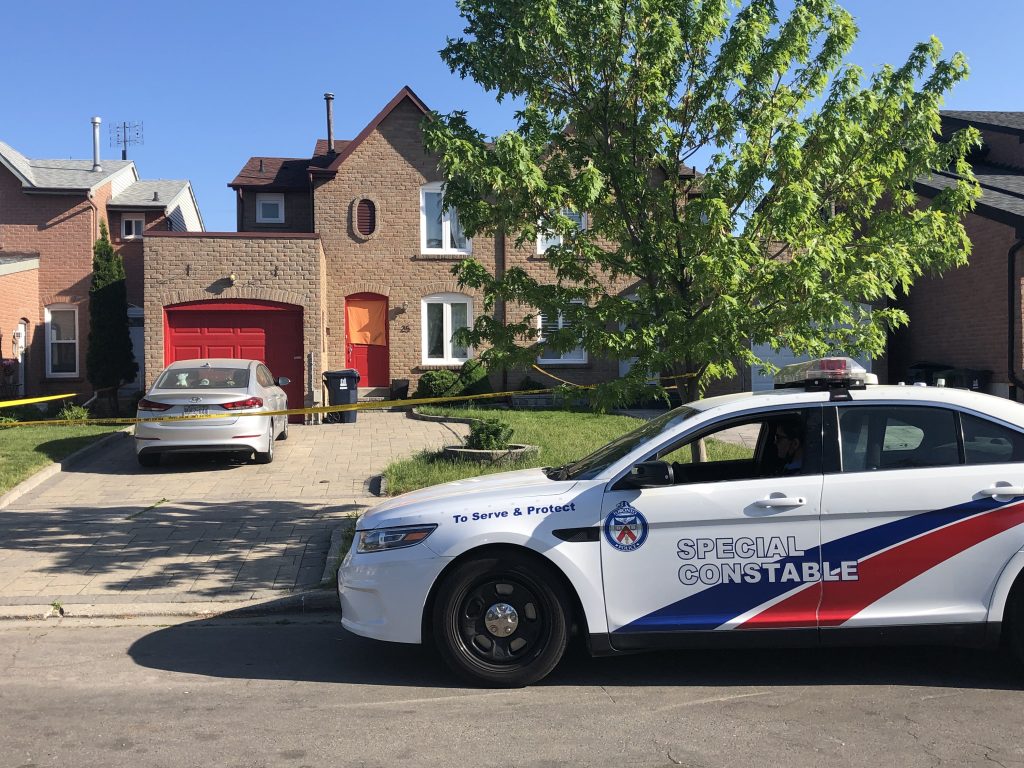
Toronto police are investigating after two people were found dead in a Scarborough home on Saturday.
Police said they were called for a wellness check at 25 James Park Square, near Brimley Road and McNicoll Avenue, at around 7:45 p.m.
When officers arrived, they found a deceased woman in the hallway with “obvious signs of trauma,” police said.
A deceased man was also found in the basement.
On Monday, police identified the deceased woman as 46-year-old Toronto resident Daisy Sehgal.
“An autopsy revealed her cause of death to be neck compressions,” police said in a news release Monday.
The deceased male has been identified by police as Anurag Kalwar, 50, of Toronto.
His cause of death was not released by the police.
“The Toronto Police Homicide Unit has taken carriage of the investigation,” police said. “The deaths are not being treated as suspicious, there are no outstanding suspects.”
Police said this is Toronto’s 24th homicide of the year.
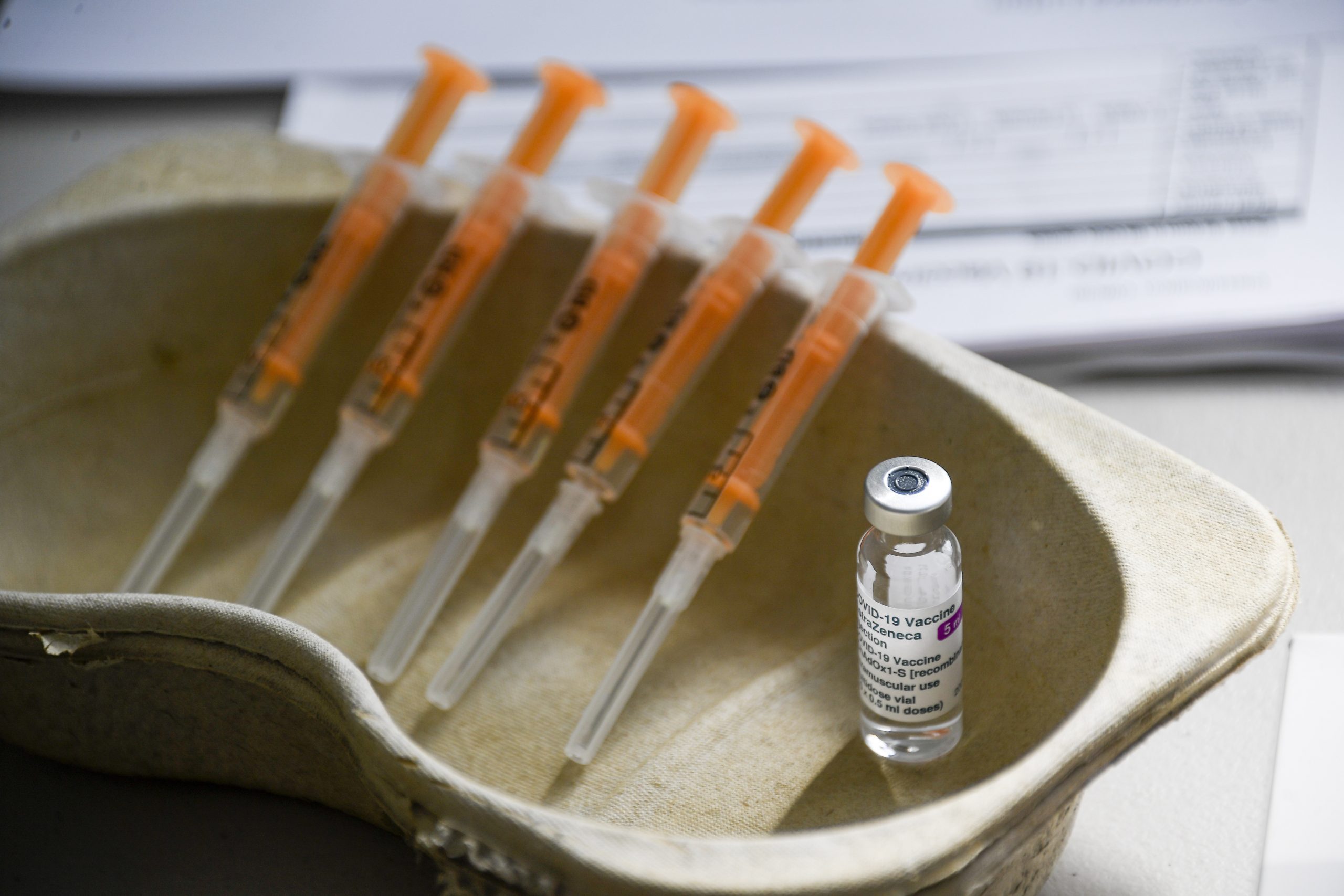
British health officials expressed optimism Sunday that the coronavirus restrictions remaining in England can be lifted in June after an official study found that the Pfizer and AstraZeneca vaccines offer effective protection against the variant first identified in India.
Authorities in Britain have expressed concern in recent weeks that increasing cases of the Indian variant could jeopardize the U.K.’s so-far successful plan to reopen its economy. More than 2,880 cases of the Indian variant have been recorded in England, figures show.
The government has said the variant appears to be more transmissible, but there was still uncertainty about how concerning this was.
Jenny Harries, chief executive of the U.K. Health Security Agency, said officials in England are on track to proceed with the final stage of unlocking the country from June 21 if the public remains cautious.
“It’s looking good if people are continuing to observe all of the safety signals,” she told the BBC. However, she warned that the Indian variant is starting to become the dominant strain in parts of northwestern England, and people in hotspot areas need to be vigilant.
Health Secretary Matt Hancock also said he was “increasingly confident” the country can follow its unlocking plans.
Their comments came after a study by Public Health England found that two doses of the Pfizer or AstraZeneca vaccines offer “high levels of protection” against symptomatic disease from the Indian variant.
The study, which took place between April 5 and May 16, found that the Pfizer vaccine is 88% effective against the variant after two doses. That compared with 93% effectiveness against the variant first identified in Kent, England, researchers said.
The AstraZeneca jab was 60% effective after both doses against the Indian variant, compared with 66% against the Kent variant.
Both vaccines were only 33% effective against symptomatic disease from the Indian variant three weeks after the first dose.
Tough lockdown rules eased in most parts of the U.K. earlier this month, largely thanks to an efficient vaccine rollout program. Socializing indoors in limited numbers are again allowed in homes, restaurants and pubs, and a blanket ban on travelling abroad was also partly lifted.
Officials have said they plan to reopen nightclubs and allow large events like festivals from June 21 if infection rates continue to stay low.
More than 37.7 million people, or 72% of the adult population, have had their first vaccine dose in the U.K. About 42% have had their second dose.
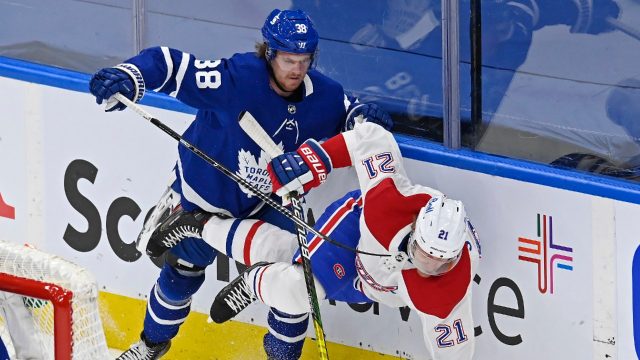
Paul Byron scored the short-handed winner from his knees with under eight minutes left in regulation and Carey Price made 35 saves as the Montreal Canadiens defeated the Toronto Maple Leafs 2-1 on Thursday in the opener of a much-anticipated first-round playoff series between Original Six rivals.
Josh Anderson had the other goal for Montreal, which finished 18 points back of first-place Toronto in the NHL’s one-off Canadian-based North Division during the pandemic-shortened regular season.
William Nylander replied for the Leafs, who got 28 stops from Jack Campbell in his playoff debut.
With Tomas Tatar off in the box for high-sticking and the Leafs looking to take the lead, Byron raced passed rookie defenceman Rasmus Sandin, who tried to drag the Montreal forward down, before roofing a shot upstairs on Campbell with 7:46 remaining in the third period.
A physical, intense start was brought to a standstill midway through the first when Leafs captain John Tavares was involved in a scary collision and had to be stretchered off the ice.
Meeting in the post-season for the first time since 1979, the storied franchises now turn their attention to Game 2 of the best-of-seven matchup, which goes Saturday back at Scotiabank Arena.
The Canadiens got a boost with the return of Price (concussion), captain Shea Weber (upper-body injury) and Brendan Gallagher (broken thumb). The Leafs, meanwhile, had defenceman Zach Bogosian (upper-body injury) back in the lineup, while centre Riley Nash (knee) made his Toronto debut after being acquired prior to the trade deadline.
Tavares was injured at 10:29 of the first after taking an initial hit from Canadiens defenceman Ben Chiarot in the neutral zone that felled Toronto’s captain before he took an accidental knee to the face from on-rushing Montreal winger Corey Perry.
Trainers and doctors from both teams rushed to attend to the veteran forward, encouraging him to stay on the ice as he struggled to get up. Tavares, who was taken to hospital, offered a thumbs up as he was stretchered off inside an empty and silent Scotiabank Arena.
Although the injury was unintentional, Perry dropped the gloves with Leafs winger Nick Foligno as soon as play resumed.
Montreal seemed to push the shock of the Tavares injury aside fastest and grabbed the lead at 12:08 when Anderson split Bogosian and Sandin before moving in alone and firing in off Campbell’s post.
Without a playoff series win since 2004, the Leafs ended the period on a power play, but Price was bailed out by one of his posts on a shot by NHL goal leader Auston Matthews.
Toronto, which had defenceman Jake Muzzin stretchered off in last summer’s post-season bubble, tied it up at 4:28 of the second on a sequence that started with a terrific Foligno forecheck. Morgan Rielly’s point shot hit a body in front and fell to Nylander, who slid his shot past Price.
Nylander had a great chance to put the home side in front on another power play later in the period, but could only find iron.
Campbell, who got the start ahead of Frederik Andersen following a record-breaking campaign, then denied Tyler Toffoli with his glove on another Montreal man advantage before Joel Armia sailed a backhand up high and wide.
Rielly blocked an Anderson chance early in the third with Campbell out of position before the Leafs killed off a Mitch Marner penalty for delay of game.
Nylander took another delay of game penalty – Toronto’s third of the night – a couple of minutes later, but Toronto survived once again. Marner was then robbed by Price’s blocker with the netminder at full stretch on a 2-on-1 with Nylander before Byron buried the winner.
Toronto got a power play with 3:18 left when Phillip Danault was whistled for tripping, but Price stopped Nylander from the slot and Zach Hyman from in close with Campbell on the bench for an extra attacker before the visitors closed it out despite more pressure at 6 on 5.
The vibe outside Scotiabank Arena was nothing like the leadup to a normal playoff series – especially between two legacy organizations – as COVID-19 restrictions continue to keep fans in Canada from attending in person.
Maple Leaf Square, normally a gathering spot for rabid crowds to watch games on a massive outdoor screen, had just a few jersey-clad fans milling about a couple of hours before puck drop.
Teams in the U.S. have all had some spectators at their playoffs games, and the Canadiens have been given the green light by Quebec’s government to allow 2,500 fans into the Bell Centre for Game 6 if the series goes that far.
Thursday’s tilt was the first in the post-season between the teams in 42 years, and opened just the third head-to-head series since the NHL started to expand back in 1967 after Toronto beat Montreal to secure the franchise’s last Stanley Cup.
Notes: Canadiens forward Jake Evans left the game with an undisclosed injury in the second period and didn’t return. Rookie winger Cole Caufield and third-year centre Jesperi Kotkaniemi were among Montreal’s healthy scratches. Games 3 and 4 of the series are set for Monday and Tuesday the Bell Centre.









